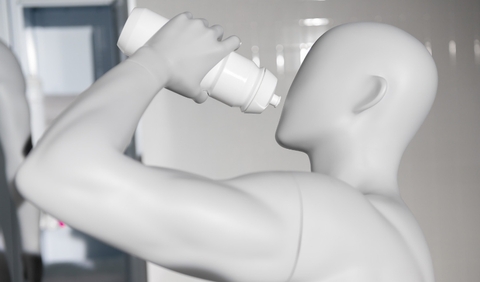
Why Your Body Needs Water
Water makes up about 60 percent of your body, which means nearly every system depends on it. It regulates temperature, transports nutrients, removes waste, and cushions your joints. It also keeps your heart, brain, and muscles functioning properly. Without enough water, these systems begin to struggle, leading to fatigue, headaches, and dizziness. Many experts believe that staying hydrated supports long-term health and helps prevent unnecessary strain on your organs.
Water as the Body’s Transport and Waste Management System
The most critical role water plays is within your body’s internal transport system. Your blood is more than 90 percent water, acting as the highway that carries nutrients, oxygen, and hormones to every cell throughout your body, fueling all your activities from studying for an exam to running a mile. Water helps your kidneys flush out toxins and waste, preventing buildup that can lead to health issues. It is also essential for maintaining a healthy digestive system, preventing constipation, and breaking down food and helping nutrients absorb efficiently. When water intake drops, these processes slow down, leaving your body working harder than it should.
The Impact of Hydration on Energy and Brain Function
Many experts believe that even mild dehydration can significantly impair your cognitive function and mood. Since your brain is roughly 75 percent water, it is especially sensitive to fluid loss. Even slight dehydration can affect focus, mood, and alertness. You might find yourself tired, irritable, or unable to concentrate, even if you had enough sleep. Water helps maintain normal brain function and keeps energy levels stable by supporting electrolyte balance. These electrolytes help transmit nerve signals and power muscle contractions. When your body lacks fluids, you may experience cramps, brain fog, or lethargy. Drinking enough water keeps your mind clear and your body energized.
Hydration, Temperature Regulation, and Physical Performance
One of water’s most important roles is regulating your internal body temperature, especially during physical activity or in hot environments. When you sweat, you lose both water and electrolytes, which are essential for muscle function and coordination. Without enough fluid, your body cannot produce adequate sweat to cool itself, causing your core temperature to rise to unsafe levels. Studies show that even a two percent loss of body fluid can lead to reduced endurance, fatigue, and slower recovery. Staying hydrated before, during, and after exercise helps your muscles perform efficiently and prevents overheating. For most workouts, plain water is enough, but during longer or more intense sessions, adding electrolytes can help replace what you lose through sweat and keep your energy steady.
Water’s Role in Joint and Tissue Health
Water acts as a natural lubricant for your joints, spinal cord, and tissues. It is a key component of synovial fluid, the substance that cushions your joints and reduces friction as you move. It also keeps tissues in your eyes, nose, and mouth moist. When you are dehydrated, this lubrication decreases, causing stiffness or discomfort. Staying hydrated supports flexibility, reduces soreness, and helps your body recover faster after physical activity. Think of dehydration like forgetting to oil a machine; everything grinds and moves with difficulty, leading to discomfort and potential long term damage.
The Role of Electrolytes
Electrolytes like sodium, potassium, and magnesium help balance your body’s fluids and support nerve and muscle function. When you sweat, you lose these minerals, which can lead to weakness or cramps. Eating foods such as bananas, avocados, and leafy greens helps replenish electrolytes naturally. Coconut water and low-sugar electrolyte drinks can also restore balance during long workouts.
Hydration for Clear and Vibrant Skin
Water plays a major role in keeping your skin healthy and vibrant. It helps maintain your skin’s natural moisture balance, which keeps it soft, smooth, and resilient. When you are properly hydrated, your body can deliver essential nutrients to skin cells more effectively and remove toxins that contribute to dullness or breakouts. Hydration also supports elasticity, which helps reduce the appearance of fine lines and dryness. While drinking water alone will not replace a good skincare routine, it creates the foundation your skin needs to stay clear and glowing. Many experts believe that consistent hydration from within is one of the simplest and most effective ways to support a healthy complexion over time.
Signs of Dehydration
Dehydration occurs when your body loses more fluid than it takes in. You might not always feel thirsty, but your body sends other warnings. Common signs include dark urine, dry mouth, muscle cramps, and sluggishness. In more serious cases, dehydration can cause confusion or a rapid heartbeat. Even a small drop in fluid levels can affect focus and energy. If you often feel tired or get frequent headaches, dehydration could be the cause.
How Much Water Do You Really Need?
The familiar “eight glasses a day” rule is a general guideline, but your needs depend on age, activity, and climate. A good target is around two liters daily, more if you exercise or live somewhere warm. Hydrating foods like cucumbers, oranges, and watermelon also contribute to your intake. Many experts suggest sipping water consistently throughout the day instead of waiting until you feel thirsty, since thirst is already a sign that your body is running low.
Tips to Stay Hydrated
Start your morning with a glass of water to wake up your system. Keep a refillable bottle nearby during the day and set reminders if you tend to forget. Add fruit or herbs like lemon, mint, or cucumber for a refreshing twist. Herbal teas are another great option, especially in cooler months. Remember, staying hydrated is about consistency, not chugging large amounts at once.
Frequently Asked Questions
1. Can I drink too much water?
Yes, but it is uncommon. Drinking excessive amounts too quickly can dilute sodium levels, leading to a condition called hyponatremia. Sip water throughout the day instead of all at once.
2. Do coffee and tea count toward hydration?
Partly. Coffee and tea contain water but also caffeine, which is mildly dehydrating. Balance them with equal amounts of plain water. Herbal teas are a better choice since they are naturally caffeine-free.
3. What are the best times to drink water?
Experts suggest drinking first thing in the morning, before meals, and during physical activity. Keeping water nearby helps you remember to sip often. But you should be drinking water throughout the day.
4. Are sports drinks necessary?
Only for long workouts or heavy sweating. For most people, plain water and a balanced diet are enough.
5. What are early signs of dehydration?
Fatigue, dry mouth, headache, and dark yellow urine are early warnings. Feeling thirsty means your body is already behind on fluids.
Water is the single most vital element your body needs, and getting enough of it can transform your energy and overall functioning. While diet and exercise often take the spotlight, many experts agree that hydration is the most overlooked key to feeling great. Your body is composed of about 60 percent water, and every cell, tissue, and organ depends on it to work properly. When you become even slightly dehydrated, every one of these systems slows down. Without enough water, your energy drops, your skin dulls, and your focus fades. Staying hydrated is not just about quenching your thirst, it is about maintaining balance throughout your entire system. Prioritizing hydration is one of the easiest yet most powerful ways to boost your health and keep your body’s engine running smoothly all day.
Recent studies suggest that even mild dehydration can impact concentration and endurance. Whether you are exercising, working long hours, or simply going about your day, drinking enough water helps your body perform at its best. This article explores why hydration matters, how much water you need, and the best ways to stay hydrated.
Why Your Body Needs Water
Water makes up about 60 percent of your body, which means nearly every system depends on it. It regulates temperature, transports nutrients, removes waste, and cushions your joints. It also keeps your heart, brain, and muscles functioning properly. Without enough water, these systems begin to struggle, leading to fatigue, headaches, and dizziness. Many experts believe that staying hydrated supports long-term health and helps prevent unnecessary strain on your organs.
Water as the Body’s Transport and Waste Management System
The most critical role water plays is within your body’s internal transport system. Your blood is more than 90 percent water, acting as the highway that carries nutrients, oxygen, and hormones to every cell throughout your body, fueling all your activities from studying for an exam to running a mile. Water helps your kidneys flush out toxins and waste, preventing buildup that can lead to health issues. It is also essential for maintaining a healthy digestive system, preventing constipation, and breaking down food and helping nutrients absorb efficiently. When water intake drops, these processes slow down, leaving your body working harder than it should.
The Impact of Hydration on Energy and Brain Function
Many experts believe that even mild dehydration can significantly impair your cognitive function and mood. Since your brain is roughly 75 percent water, it is especially sensitive to fluid loss. Even slight dehydration can affect focus, mood, and alertness. You might find yourself tired, irritable, or unable to concentrate, even if you had enough sleep. Water helps maintain normal brain function and keeps energy levels stable by supporting electrolyte balance. These electrolytes help transmit nerve signals and power muscle contractions. When your body lacks fluids, you may experience cramps, brain fog, or lethargy. Drinking enough water keeps your mind clear and your body energized.
Hydration, Temperature Regulation, and Physical Performance
One of water’s most important roles is regulating your internal body temperature, especially during physical activity or in hot environments. When you sweat, you lose both water and electrolytes, which are essential for muscle function and coordination. Without enough fluid, your body cannot produce adequate sweat to cool itself, causing your core temperature to rise to unsafe levels. Studies show that even a two percent loss of body fluid can lead to reduced endurance, fatigue, and slower recovery. Staying hydrated before, during, and after exercise helps your muscles perform efficiently and prevents overheating. For most workouts, plain water is enough, but during longer or more intense sessions, adding electrolytes can help replace what you lose through sweat and keep your energy steady.
Water’s Role in Joint and Tissue Health
Water acts as a natural lubricant for your joints, spinal cord, and tissues. It is a key component of synovial fluid, the substance that cushions your joints and reduces friction as you move. It also keeps tissues in your eyes, nose, and mouth moist. When you are dehydrated, this lubrication decreases, causing stiffness or discomfort. Staying hydrated supports flexibility, reduces soreness, and helps your body recover faster after physical activity. Think of dehydration like forgetting to oil a machine; everything grinds and moves with difficulty, leading to discomfort and potential long term damage.
The Role of Electrolytes
Electrolytes like sodium, potassium, and magnesium help balance your body’s fluids and support nerve and muscle function. When you sweat, you lose these minerals, which can lead to weakness or cramps. Eating foods such as bananas, avocados, and leafy greens helps replenish electrolytes naturally. Coconut water and low-sugar electrolyte drinks can also restore balance during long workouts.
Hydration for Clear and Vibrant Skin
Water plays a major role in keeping your skin healthy and vibrant. It helps maintain your skin’s natural moisture balance, which keeps it soft, smooth, and resilient. When you are properly hydrated, your body can deliver essential nutrients to skin cells more effectively and remove toxins that contribute to dullness or breakouts. Hydration also supports elasticity, which helps reduce the appearance of fine lines and dryness. While drinking water alone will not replace a good skincare routine, it creates the foundation your skin needs to stay clear and glowing. Many experts believe that consistent hydration from within is one of the simplest and most effective ways to support a healthy complexion over time.
Signs of Dehydration
Dehydration occurs when your body loses more fluid than it takes in. You might not always feel thirsty, but your body sends other warnings. Common signs include dark urine, dry mouth, muscle cramps, and sluggishness. In more serious cases, dehydration can cause confusion or a rapid heartbeat. Even a small drop in fluid levels can affect focus and energy. If you often feel tired or get frequent headaches, dehydration could be the cause.
How Much Water Do You Really Need?
The familiar “eight glasses a day” rule is a general guideline, but your needs depend on age, activity, and climate. A good target is around two liters daily, more if you exercise or live somewhere warm. Hydrating foods like cucumbers, oranges, and watermelon also contribute to your intake. Many experts suggest sipping water consistently throughout the day instead of waiting until you feel thirsty, since thirst is already a sign that your body is running low.
Tips to Stay Hydrated
Start your morning with a glass of water to wake up your system. Keep a refillable bottle nearby during the day and set reminders if you tend to forget. Add fruit or herbs like lemon, mint, or cucumber for a refreshing twist. Herbal teas are another great option, especially in cooler months. Remember, staying hydrated is about consistency, not chugging large amounts at once.
Frequently Asked Questions
1. Can I drink too much water?
Yes, but it is uncommon. Drinking excessive amounts too quickly can dilute sodium levels, leading to a condition called hyponatremia. Sip water throughout the day instead of all at once.
2. Do coffee and tea count toward hydration?
Partly. Coffee and tea contain water but also caffeine, which is mildly dehydrating. Balance them with equal amounts of plain water. Herbal teas are a better choice since they are naturally caffeine-free.
3. What are the best times to drink water?
Experts suggest drinking first thing in the morning, before meals, and during physical activity. Keeping water nearby helps you remember to sip often. But you should be drinking water throughout the day.
4. Are sports drinks necessary?
Only for long workouts or heavy sweating. For most people, plain water and a balanced diet are enough.
5. What are early signs of dehydration?
Fatigue, dry mouth, headache, and dark yellow urine are early warnings. Feeling thirsty means your body is already behind on fluids.

Hydration is one of the simplest and most effective ways to support your health. Your body depends on water for everything, from maintaining energy to supporting mental clarity. When you make hydration a daily habit, you give your body the foundation it needs to function smoothly. Even small improvements can noticeably enhance mood, focus, and well-being.
Drinking enough water is more than a health tip, it is an act of daily self-care. Whether you are working, exercising, or relaxing, keep water nearby and listen to your body’s cues. Consistent hydration powers your energy, focus, and overall vitality, helping you feel your best every single day.
Related posts




